Analysis of Theories, Principles and Models in Education and Training
VerifiedAdded on 2023/01/13
|12
|3585
|40
Report
AI Summary
This report provides a comprehensive analysis of theories, principles, and models in education and training. It begins by exploring various learning theories such as sensory stimulation and social learning theory, along with different models like MacWhinney’s emergentist model and Piaget's cognitivism model. The report then delves into the application of these theories and models in teaching, learning, and assessment, emphasizing the importance of identifying and accommodating learners' individual preferences for inclusive practices. The report further examines theories and models of curriculum development, including the Hilda Taba Model and the Saylor, Alexander & Lewis Model, and explains how these can be applied in developing curricula. It also discusses assessment theories, principles, and models, covering behaviorism, cognitivism, constructivism, humanism, and connectivism. The report concludes by highlighting the significance of these concepts in fostering effective education and training environments.
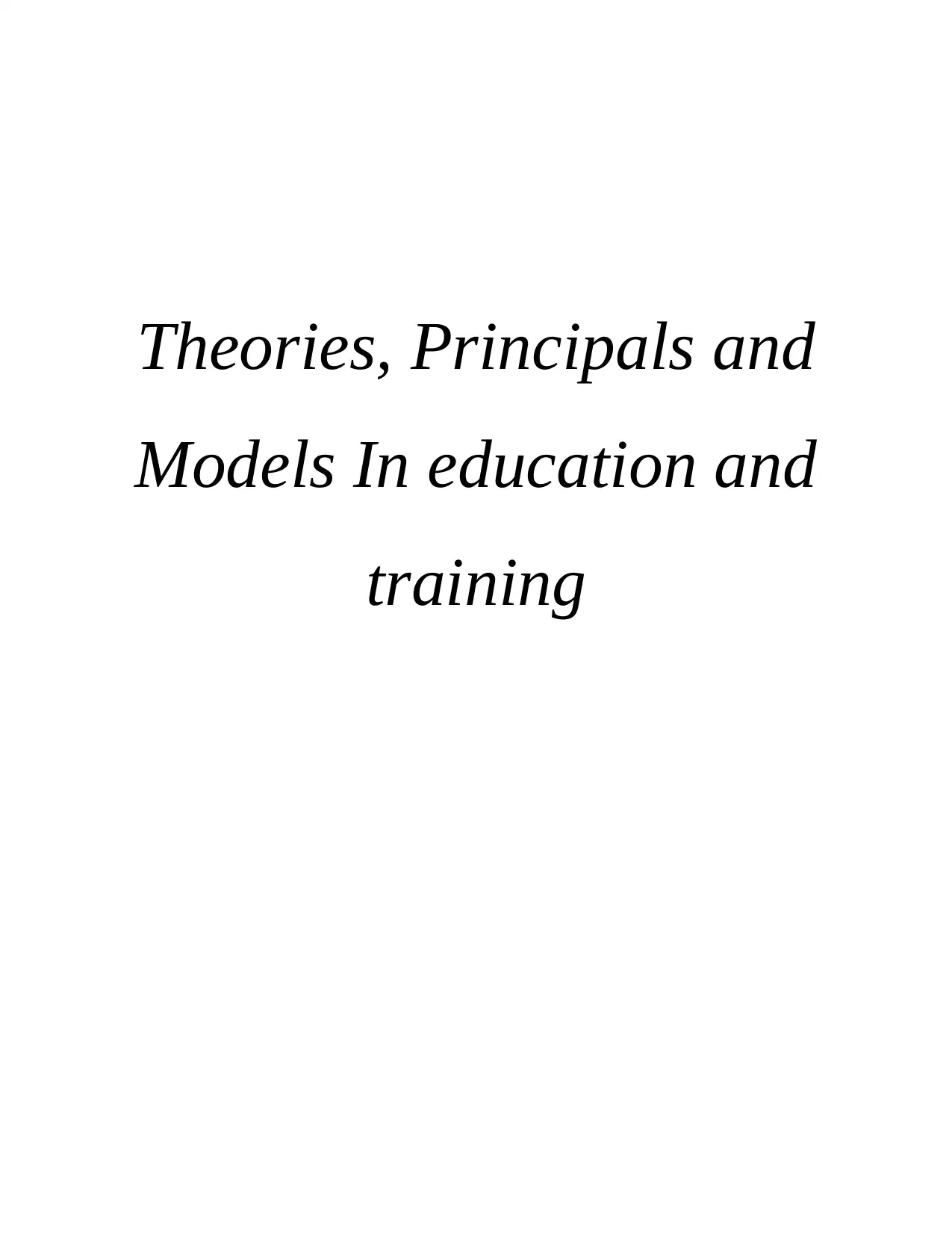
Theories, Principals and
Models In education and
training
Models In education and
training
Paraphrase This Document
Need a fresh take? Get an instant paraphrase of this document with our AI Paraphraser
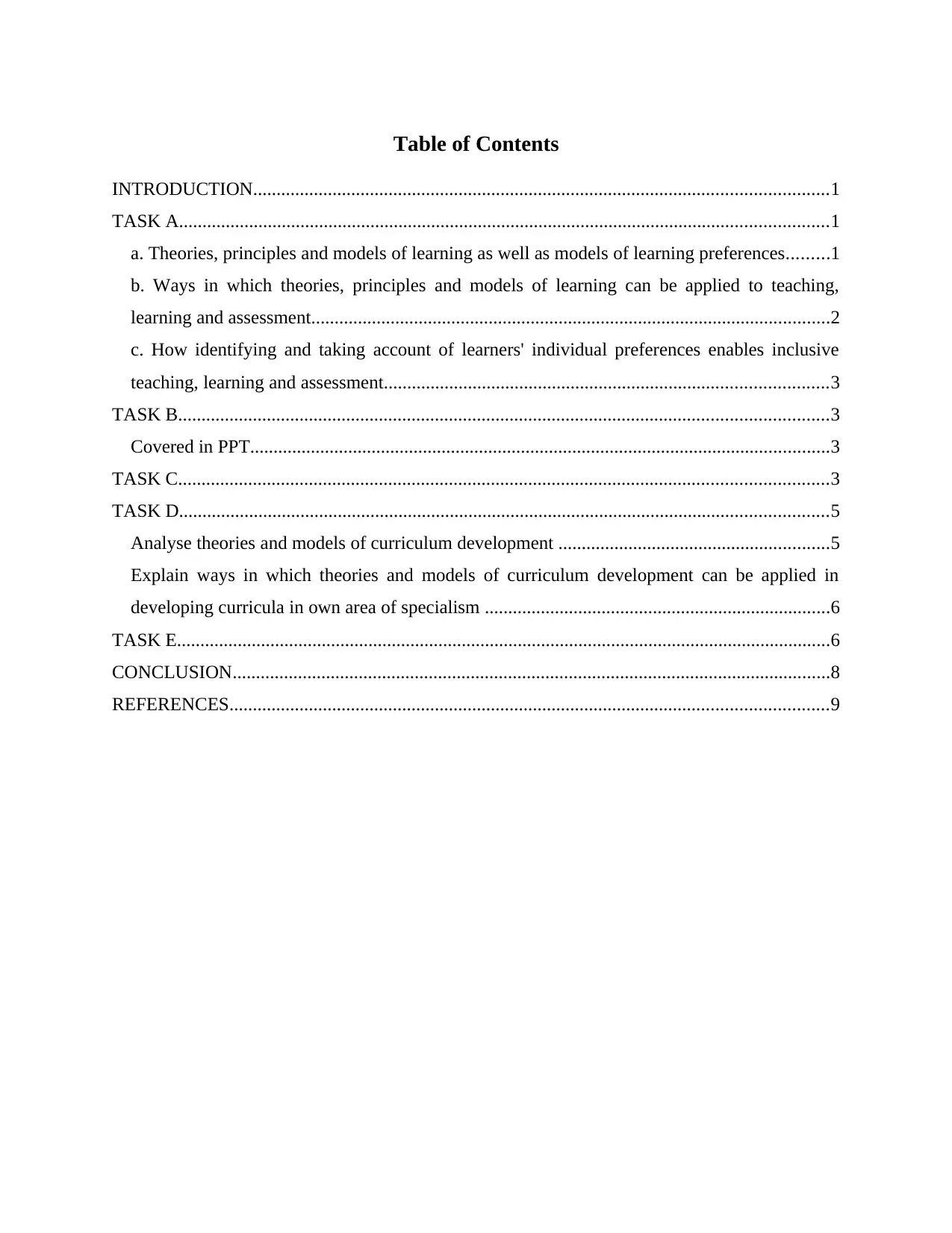
Table of Contents
INTRODUCTION...........................................................................................................................1
TASK A...........................................................................................................................................1
a. Theories, principles and models of learning as well as models of learning preferences.........1
b. Ways in which theories, principles and models of learning can be applied to teaching,
learning and assessment...............................................................................................................2
c. How identifying and taking account of learners' individual preferences enables inclusive
teaching, learning and assessment...............................................................................................3
TASK B...........................................................................................................................................3
Covered in PPT............................................................................................................................3
TASK C...........................................................................................................................................3
TASK D...........................................................................................................................................5
Analyse theories and models of curriculum development ..........................................................5
Explain ways in which theories and models of curriculum development can be applied in
developing curricula in own area of specialism ..........................................................................6
TASK E............................................................................................................................................6
CONCLUSION................................................................................................................................8
REFERENCES................................................................................................................................9
INTRODUCTION...........................................................................................................................1
TASK A...........................................................................................................................................1
a. Theories, principles and models of learning as well as models of learning preferences.........1
b. Ways in which theories, principles and models of learning can be applied to teaching,
learning and assessment...............................................................................................................2
c. How identifying and taking account of learners' individual preferences enables inclusive
teaching, learning and assessment...............................................................................................3
TASK B...........................................................................................................................................3
Covered in PPT............................................................................................................................3
TASK C...........................................................................................................................................3
TASK D...........................................................................................................................................5
Analyse theories and models of curriculum development ..........................................................5
Explain ways in which theories and models of curriculum development can be applied in
developing curricula in own area of specialism ..........................................................................6
TASK E............................................................................................................................................6
CONCLUSION................................................................................................................................8
REFERENCES................................................................................................................................9
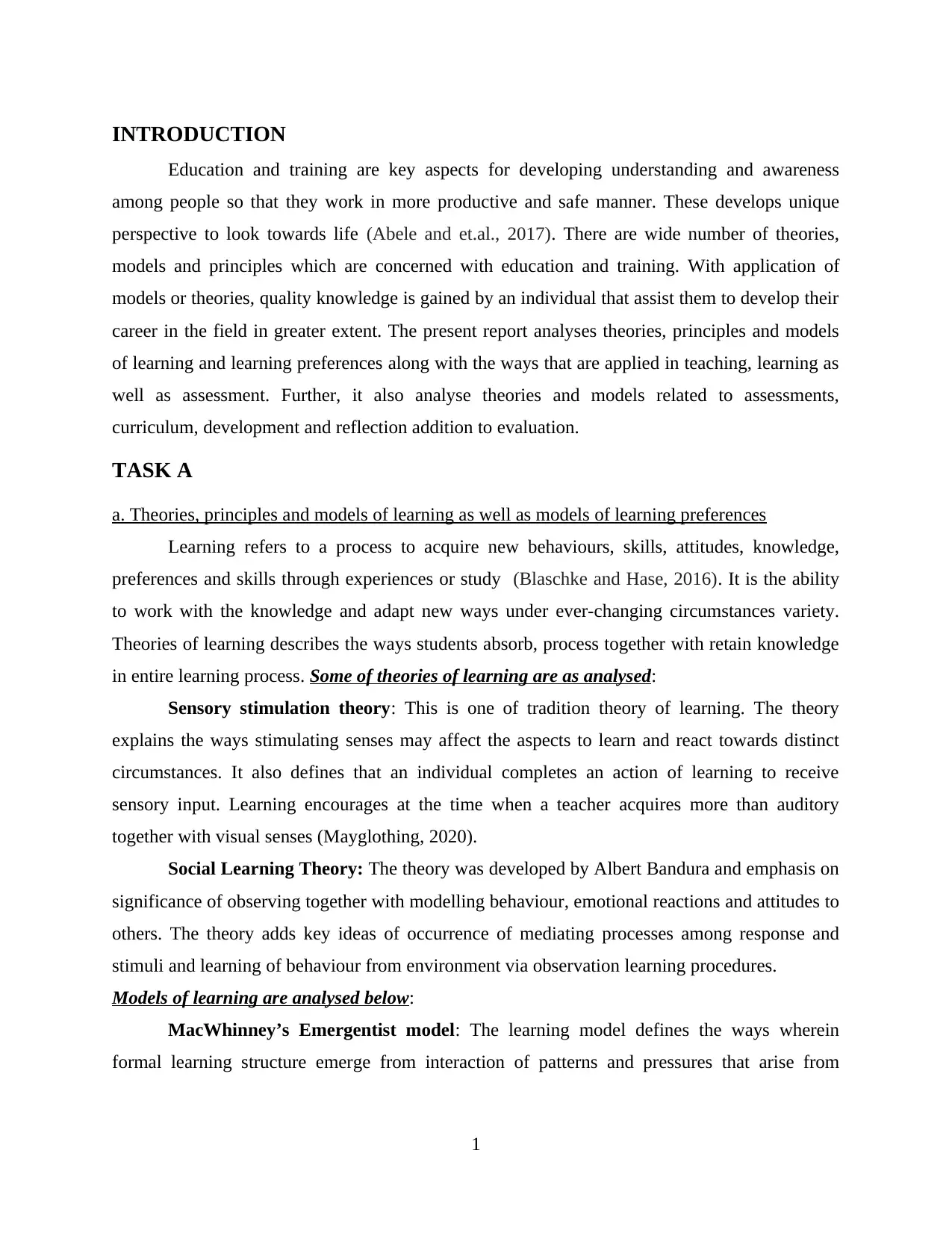
INTRODUCTION
Education and training are key aspects for developing understanding and awareness
among people so that they work in more productive and safe manner. These develops unique
perspective to look towards life (Abele and et.al., 2017). There are wide number of theories,
models and principles which are concerned with education and training. With application of
models or theories, quality knowledge is gained by an individual that assist them to develop their
career in the field in greater extent. The present report analyses theories, principles and models
of learning and learning preferences along with the ways that are applied in teaching, learning as
well as assessment. Further, it also analyse theories and models related to assessments,
curriculum, development and reflection addition to evaluation.
TASK A
a. Theories, principles and models of learning as well as models of learning preferences
Learning refers to a process to acquire new behaviours, skills, attitudes, knowledge,
preferences and skills through experiences or study (Blaschke and Hase, 2016). It is the ability
to work with the knowledge and adapt new ways under ever-changing circumstances variety.
Theories of learning describes the ways students absorb, process together with retain knowledge
in entire learning process. Some of theories of learning are as analysed:
Sensory stimulation theory: This is one of tradition theory of learning. The theory
explains the ways stimulating senses may affect the aspects to learn and react towards distinct
circumstances. It also defines that an individual completes an action of learning to receive
sensory input. Learning encourages at the time when a teacher acquires more than auditory
together with visual senses (Mayglothing, 2020).
Social Learning Theory: The theory was developed by Albert Bandura and emphasis on
significance of observing together with modelling behaviour, emotional reactions and attitudes to
others. The theory adds key ideas of occurrence of mediating processes among response and
stimuli and learning of behaviour from environment via observation learning procedures.
Models of learning are analysed below:
MacWhinney’s Emergentist model: The learning model defines the ways wherein
formal learning structure emerge from interaction of patterns and pressures that arise from
1
Education and training are key aspects for developing understanding and awareness
among people so that they work in more productive and safe manner. These develops unique
perspective to look towards life (Abele and et.al., 2017). There are wide number of theories,
models and principles which are concerned with education and training. With application of
models or theories, quality knowledge is gained by an individual that assist them to develop their
career in the field in greater extent. The present report analyses theories, principles and models
of learning and learning preferences along with the ways that are applied in teaching, learning as
well as assessment. Further, it also analyse theories and models related to assessments,
curriculum, development and reflection addition to evaluation.
TASK A
a. Theories, principles and models of learning as well as models of learning preferences
Learning refers to a process to acquire new behaviours, skills, attitudes, knowledge,
preferences and skills through experiences or study (Blaschke and Hase, 2016). It is the ability
to work with the knowledge and adapt new ways under ever-changing circumstances variety.
Theories of learning describes the ways students absorb, process together with retain knowledge
in entire learning process. Some of theories of learning are as analysed:
Sensory stimulation theory: This is one of tradition theory of learning. The theory
explains the ways stimulating senses may affect the aspects to learn and react towards distinct
circumstances. It also defines that an individual completes an action of learning to receive
sensory input. Learning encourages at the time when a teacher acquires more than auditory
together with visual senses (Mayglothing, 2020).
Social Learning Theory: The theory was developed by Albert Bandura and emphasis on
significance of observing together with modelling behaviour, emotional reactions and attitudes to
others. The theory adds key ideas of occurrence of mediating processes among response and
stimuli and learning of behaviour from environment via observation learning procedures.
Models of learning are analysed below:
MacWhinney’s Emergentist model: The learning model defines the ways wherein
formal learning structure emerge from interaction of patterns and pressures that arise from
1
⊘ This is a preview!⊘
Do you want full access?
Subscribe today to unlock all pages.

Trusted by 1+ million students worldwide
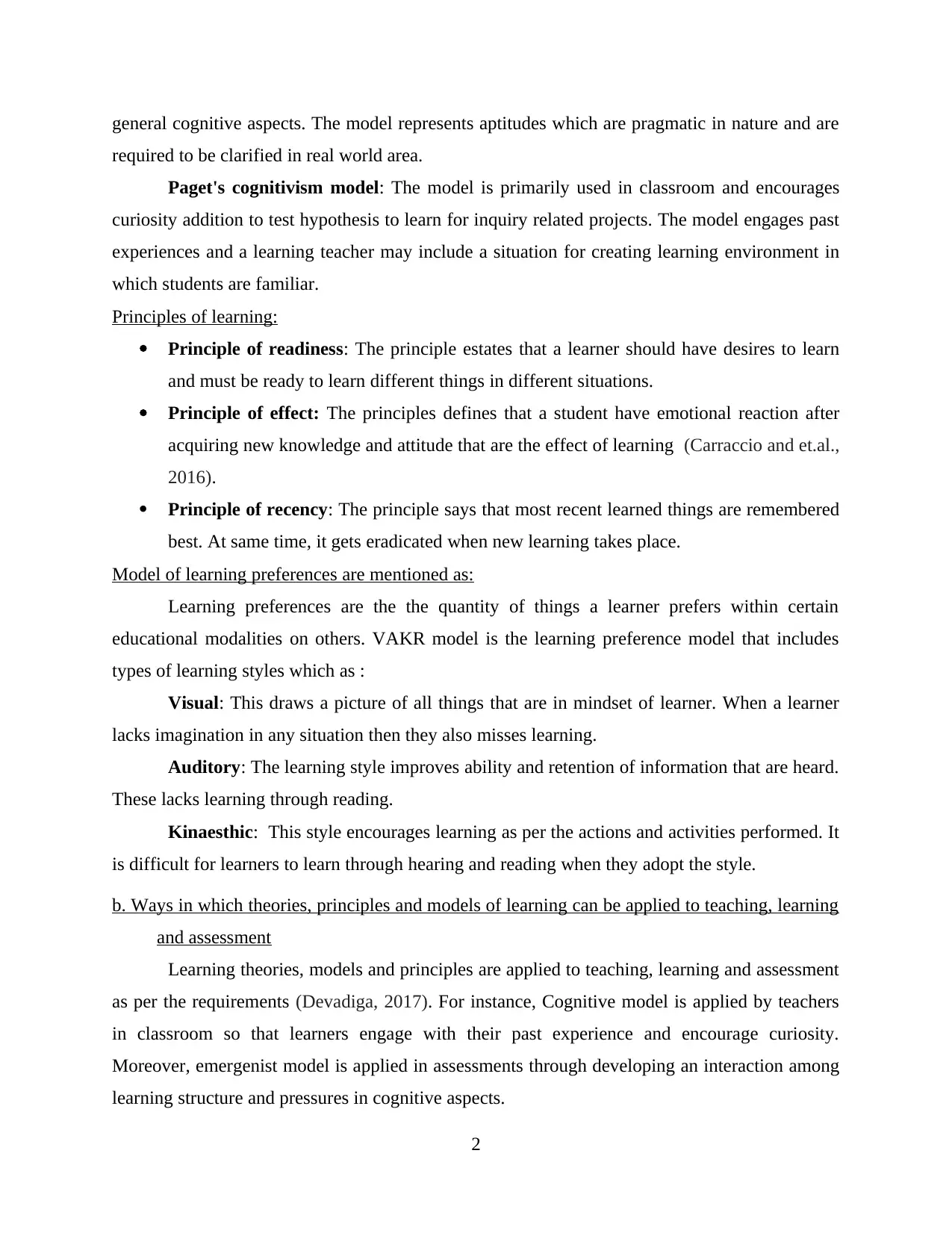
general cognitive aspects. The model represents aptitudes which are pragmatic in nature and are
required to be clarified in real world area.
Paget's cognitivism model: The model is primarily used in classroom and encourages
curiosity addition to test hypothesis to learn for inquiry related projects. The model engages past
experiences and a learning teacher may include a situation for creating learning environment in
which students are familiar.
Principles of learning:
Principle of readiness: The principle estates that a learner should have desires to learn
and must be ready to learn different things in different situations.
Principle of effect: The principles defines that a student have emotional reaction after
acquiring new knowledge and attitude that are the effect of learning (Carraccio and et.al.,
2016).
Principle of recency: The principle says that most recent learned things are remembered
best. At same time, it gets eradicated when new learning takes place.
Model of learning preferences are mentioned as:
Learning preferences are the the quantity of things a learner prefers within certain
educational modalities on others. VAKR model is the learning preference model that includes
types of learning styles which as :
Visual: This draws a picture of all things that are in mindset of learner. When a learner
lacks imagination in any situation then they also misses learning.
Auditory: The learning style improves ability and retention of information that are heard.
These lacks learning through reading.
Kinaesthic: This style encourages learning as per the actions and activities performed. It
is difficult for learners to learn through hearing and reading when they adopt the style.
b. Ways in which theories, principles and models of learning can be applied to teaching, learning
and assessment
Learning theories, models and principles are applied to teaching, learning and assessment
as per the requirements (Devadiga, 2017). For instance, Cognitive model is applied by teachers
in classroom so that learners engage with their past experience and encourage curiosity.
Moreover, emergenist model is applied in assessments through developing an interaction among
learning structure and pressures in cognitive aspects.
2
required to be clarified in real world area.
Paget's cognitivism model: The model is primarily used in classroom and encourages
curiosity addition to test hypothesis to learn for inquiry related projects. The model engages past
experiences and a learning teacher may include a situation for creating learning environment in
which students are familiar.
Principles of learning:
Principle of readiness: The principle estates that a learner should have desires to learn
and must be ready to learn different things in different situations.
Principle of effect: The principles defines that a student have emotional reaction after
acquiring new knowledge and attitude that are the effect of learning (Carraccio and et.al.,
2016).
Principle of recency: The principle says that most recent learned things are remembered
best. At same time, it gets eradicated when new learning takes place.
Model of learning preferences are mentioned as:
Learning preferences are the the quantity of things a learner prefers within certain
educational modalities on others. VAKR model is the learning preference model that includes
types of learning styles which as :
Visual: This draws a picture of all things that are in mindset of learner. When a learner
lacks imagination in any situation then they also misses learning.
Auditory: The learning style improves ability and retention of information that are heard.
These lacks learning through reading.
Kinaesthic: This style encourages learning as per the actions and activities performed. It
is difficult for learners to learn through hearing and reading when they adopt the style.
b. Ways in which theories, principles and models of learning can be applied to teaching, learning
and assessment
Learning theories, models and principles are applied to teaching, learning and assessment
as per the requirements (Devadiga, 2017). For instance, Cognitive model is applied by teachers
in classroom so that learners engage with their past experience and encourage curiosity.
Moreover, emergenist model is applied in assessments through developing an interaction among
learning structure and pressures in cognitive aspects.
2
Paraphrase This Document
Need a fresh take? Get an instant paraphrase of this document with our AI Paraphraser
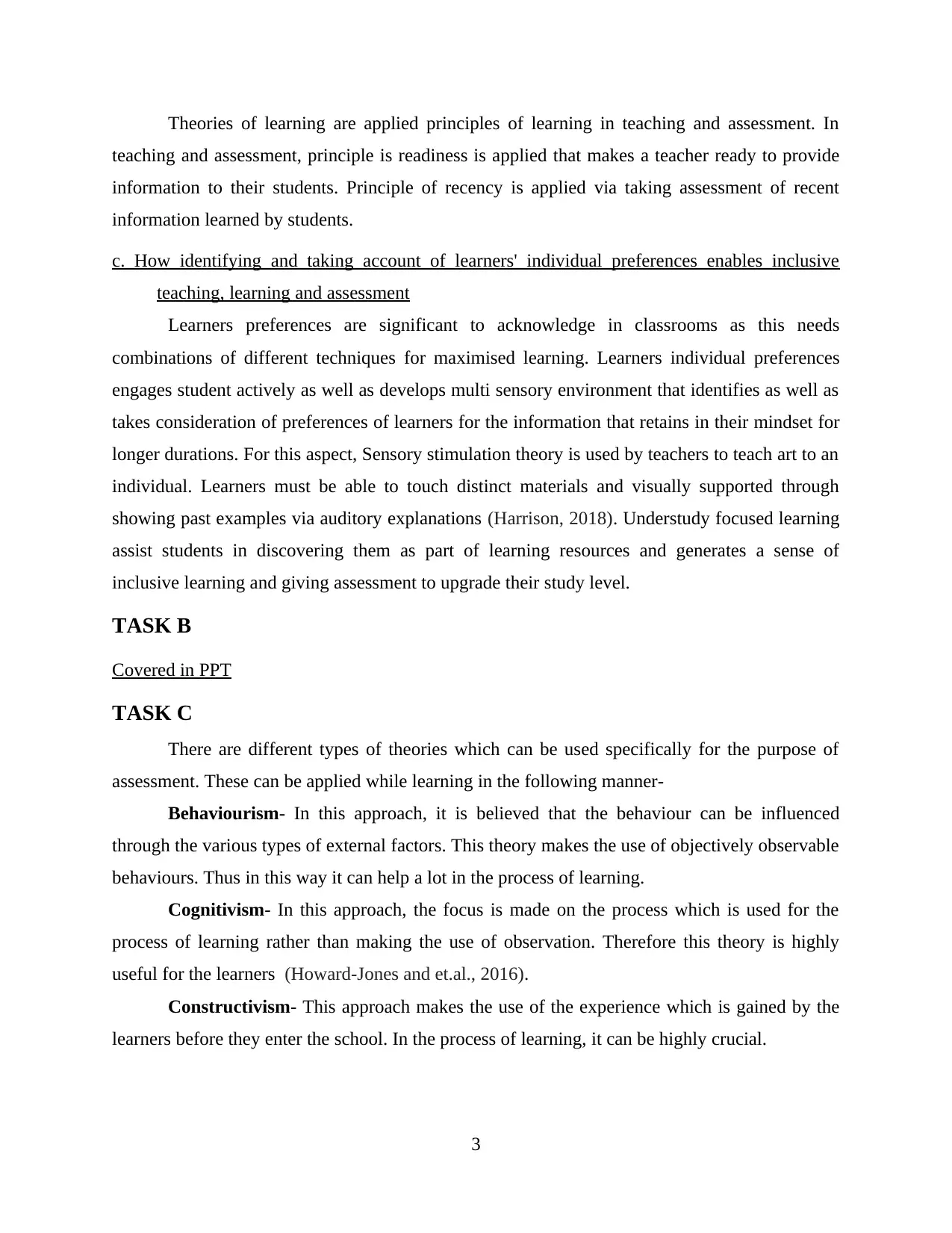
Theories of learning are applied principles of learning in teaching and assessment. In
teaching and assessment, principle is readiness is applied that makes a teacher ready to provide
information to their students. Principle of recency is applied via taking assessment of recent
information learned by students.
c. How identifying and taking account of learners' individual preferences enables inclusive
teaching, learning and assessment
Learners preferences are significant to acknowledge in classrooms as this needs
combinations of different techniques for maximised learning. Learners individual preferences
engages student actively as well as develops multi sensory environment that identifies as well as
takes consideration of preferences of learners for the information that retains in their mindset for
longer durations. For this aspect, Sensory stimulation theory is used by teachers to teach art to an
individual. Learners must be able to touch distinct materials and visually supported through
showing past examples via auditory explanations (Harrison, 2018). Understudy focused learning
assist students in discovering them as part of learning resources and generates a sense of
inclusive learning and giving assessment to upgrade their study level.
TASK B
Covered in PPT
TASK C
There are different types of theories which can be used specifically for the purpose of
assessment. These can be applied while learning in the following manner-
Behaviourism- In this approach, it is believed that the behaviour can be influenced
through the various types of external factors. This theory makes the use of objectively observable
behaviours. Thus in this way it can help a lot in the process of learning.
Cognitivism- In this approach, the focus is made on the process which is used for the
process of learning rather than making the use of observation. Therefore this theory is highly
useful for the learners (Howard-Jones and et.al., 2016).
Constructivism- This approach makes the use of the experience which is gained by the
learners before they enter the school. In the process of learning, it can be highly crucial.
3
teaching and assessment, principle is readiness is applied that makes a teacher ready to provide
information to their students. Principle of recency is applied via taking assessment of recent
information learned by students.
c. How identifying and taking account of learners' individual preferences enables inclusive
teaching, learning and assessment
Learners preferences are significant to acknowledge in classrooms as this needs
combinations of different techniques for maximised learning. Learners individual preferences
engages student actively as well as develops multi sensory environment that identifies as well as
takes consideration of preferences of learners for the information that retains in their mindset for
longer durations. For this aspect, Sensory stimulation theory is used by teachers to teach art to an
individual. Learners must be able to touch distinct materials and visually supported through
showing past examples via auditory explanations (Harrison, 2018). Understudy focused learning
assist students in discovering them as part of learning resources and generates a sense of
inclusive learning and giving assessment to upgrade their study level.
TASK B
Covered in PPT
TASK C
There are different types of theories which can be used specifically for the purpose of
assessment. These can be applied while learning in the following manner-
Behaviourism- In this approach, it is believed that the behaviour can be influenced
through the various types of external factors. This theory makes the use of objectively observable
behaviours. Thus in this way it can help a lot in the process of learning.
Cognitivism- In this approach, the focus is made on the process which is used for the
process of learning rather than making the use of observation. Therefore this theory is highly
useful for the learners (Howard-Jones and et.al., 2016).
Constructivism- This approach makes the use of the experience which is gained by the
learners before they enter the school. In the process of learning, it can be highly crucial.
3
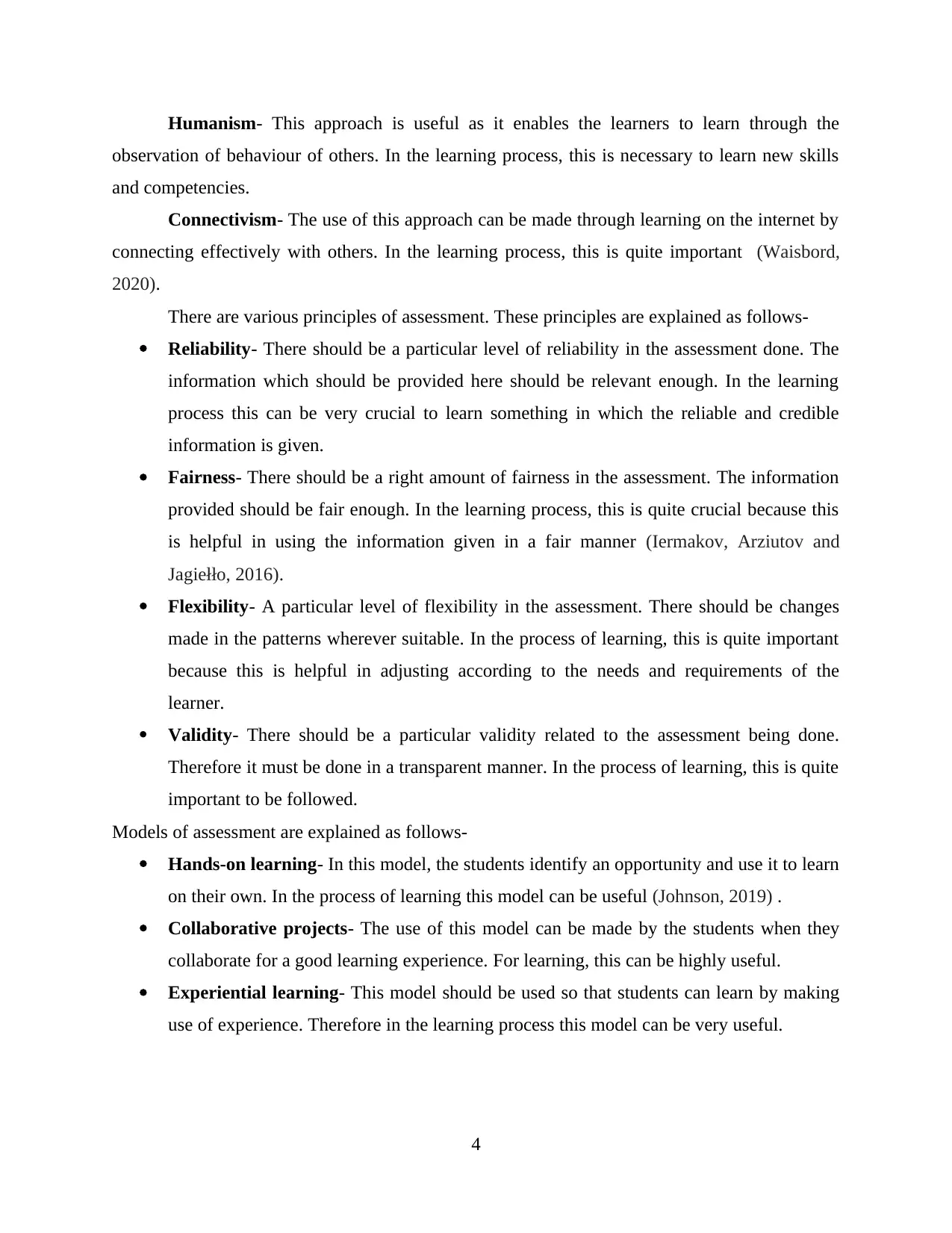
Humanism- This approach is useful as it enables the learners to learn through the
observation of behaviour of others. In the learning process, this is necessary to learn new skills
and competencies.
Connectivism- The use of this approach can be made through learning on the internet by
connecting effectively with others. In the learning process, this is quite important (Waisbord,
2020).
There are various principles of assessment. These principles are explained as follows-
Reliability- There should be a particular level of reliability in the assessment done. The
information which should be provided here should be relevant enough. In the learning
process this can be very crucial to learn something in which the reliable and credible
information is given.
Fairness- There should be a right amount of fairness in the assessment. The information
provided should be fair enough. In the learning process, this is quite crucial because this
is helpful in using the information given in a fair manner (Iermakov, Arziutov and
Jagiełło, 2016).
Flexibility- A particular level of flexibility in the assessment. There should be changes
made in the patterns wherever suitable. In the process of learning, this is quite important
because this is helpful in adjusting according to the needs and requirements of the
learner.
Validity- There should be a particular validity related to the assessment being done.
Therefore it must be done in a transparent manner. In the process of learning, this is quite
important to be followed.
Models of assessment are explained as follows-
Hands-on learning- In this model, the students identify an opportunity and use it to learn
on their own. In the process of learning this model can be useful (Johnson, 2019) .
Collaborative projects- The use of this model can be made by the students when they
collaborate for a good learning experience. For learning, this can be highly useful.
Experiential learning- This model should be used so that students can learn by making
use of experience. Therefore in the learning process this model can be very useful.
4
observation of behaviour of others. In the learning process, this is necessary to learn new skills
and competencies.
Connectivism- The use of this approach can be made through learning on the internet by
connecting effectively with others. In the learning process, this is quite important (Waisbord,
2020).
There are various principles of assessment. These principles are explained as follows-
Reliability- There should be a particular level of reliability in the assessment done. The
information which should be provided here should be relevant enough. In the learning
process this can be very crucial to learn something in which the reliable and credible
information is given.
Fairness- There should be a right amount of fairness in the assessment. The information
provided should be fair enough. In the learning process, this is quite crucial because this
is helpful in using the information given in a fair manner (Iermakov, Arziutov and
Jagiełło, 2016).
Flexibility- A particular level of flexibility in the assessment. There should be changes
made in the patterns wherever suitable. In the process of learning, this is quite important
because this is helpful in adjusting according to the needs and requirements of the
learner.
Validity- There should be a particular validity related to the assessment being done.
Therefore it must be done in a transparent manner. In the process of learning, this is quite
important to be followed.
Models of assessment are explained as follows-
Hands-on learning- In this model, the students identify an opportunity and use it to learn
on their own. In the process of learning this model can be useful (Johnson, 2019) .
Collaborative projects- The use of this model can be made by the students when they
collaborate for a good learning experience. For learning, this can be highly useful.
Experiential learning- This model should be used so that students can learn by making
use of experience. Therefore in the learning process this model can be very useful.
4
⊘ This is a preview!⊘
Do you want full access?
Subscribe today to unlock all pages.

Trusted by 1+ million students worldwide
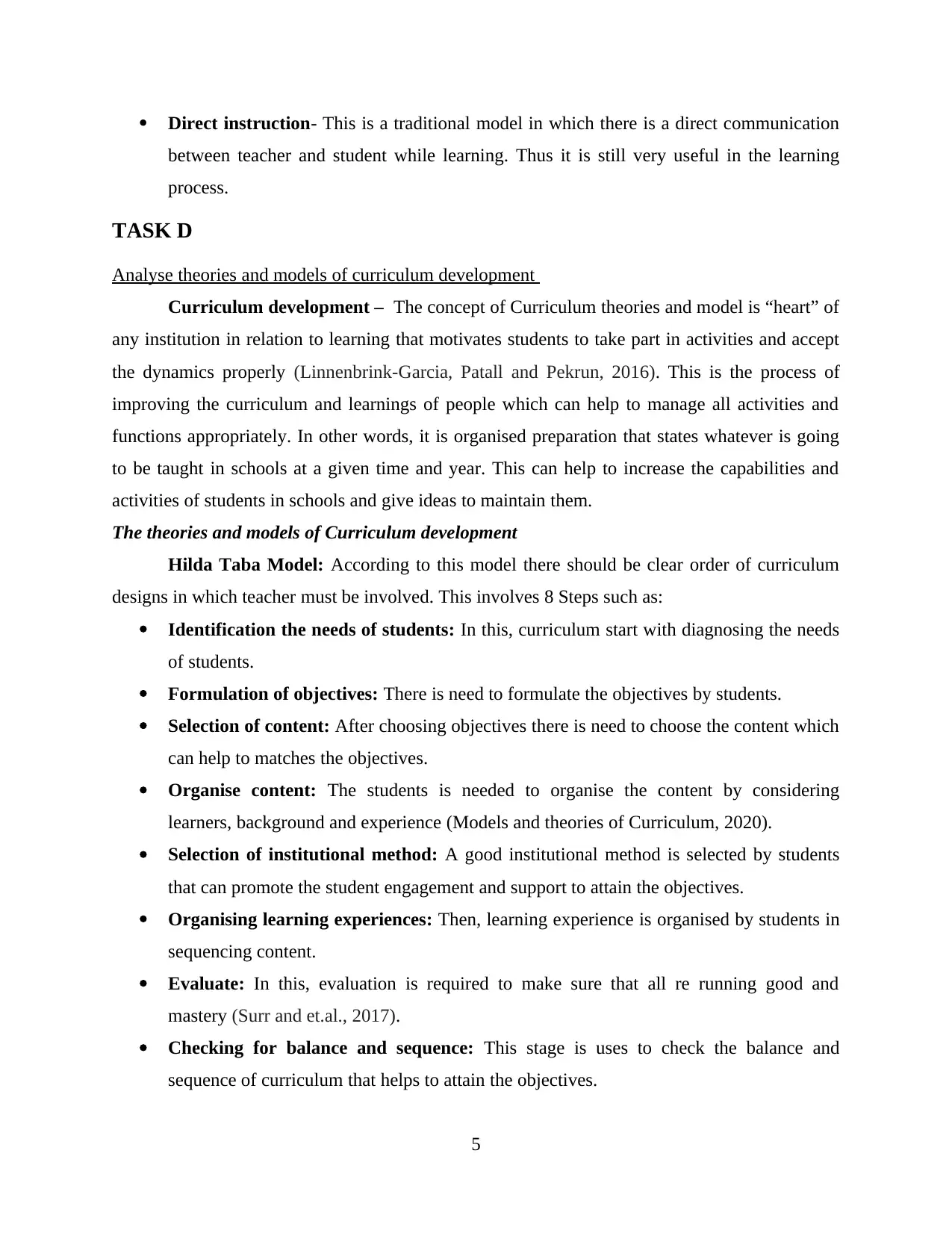
Direct instruction- This is a traditional model in which there is a direct communication
between teacher and student while learning. Thus it is still very useful in the learning
process.
TASK D
Analyse theories and models of curriculum development
Curriculum development – The concept of Curriculum theories and model is “heart” of
any institution in relation to learning that motivates students to take part in activities and accept
the dynamics properly (Linnenbrink-Garcia, Patall and Pekrun, 2016). This is the process of
improving the curriculum and learnings of people which can help to manage all activities and
functions appropriately. In other words, it is organised preparation that states whatever is going
to be taught in schools at a given time and year. This can help to increase the capabilities and
activities of students in schools and give ideas to maintain them.
The theories and models of Curriculum development
Hilda Taba Model: According to this model there should be clear order of curriculum
designs in which teacher must be involved. This involves 8 Steps such as:
Identification the needs of students: In this, curriculum start with diagnosing the needs
of students.
Formulation of objectives: There is need to formulate the objectives by students.
Selection of content: After choosing objectives there is need to choose the content which
can help to matches the objectives.
Organise content: The students is needed to organise the content by considering
learners, background and experience (Models and theories of Curriculum, 2020).
Selection of institutional method: A good institutional method is selected by students
that can promote the student engagement and support to attain the objectives.
Organising learning experiences: Then, learning experience is organised by students in
sequencing content.
Evaluate: In this, evaluation is required to make sure that all re running good and
mastery (Surr and et.al., 2017).
Checking for balance and sequence: This stage is uses to check the balance and
sequence of curriculum that helps to attain the objectives.
5
between teacher and student while learning. Thus it is still very useful in the learning
process.
TASK D
Analyse theories and models of curriculum development
Curriculum development – The concept of Curriculum theories and model is “heart” of
any institution in relation to learning that motivates students to take part in activities and accept
the dynamics properly (Linnenbrink-Garcia, Patall and Pekrun, 2016). This is the process of
improving the curriculum and learnings of people which can help to manage all activities and
functions appropriately. In other words, it is organised preparation that states whatever is going
to be taught in schools at a given time and year. This can help to increase the capabilities and
activities of students in schools and give ideas to maintain them.
The theories and models of Curriculum development
Hilda Taba Model: According to this model there should be clear order of curriculum
designs in which teacher must be involved. This involves 8 Steps such as:
Identification the needs of students: In this, curriculum start with diagnosing the needs
of students.
Formulation of objectives: There is need to formulate the objectives by students.
Selection of content: After choosing objectives there is need to choose the content which
can help to matches the objectives.
Organise content: The students is needed to organise the content by considering
learners, background and experience (Models and theories of Curriculum, 2020).
Selection of institutional method: A good institutional method is selected by students
that can promote the student engagement and support to attain the objectives.
Organising learning experiences: Then, learning experience is organised by students in
sequencing content.
Evaluate: In this, evaluation is required to make sure that all re running good and
mastery (Surr and et.al., 2017).
Checking for balance and sequence: This stage is uses to check the balance and
sequence of curriculum that helps to attain the objectives.
5
Paraphrase This Document
Need a fresh take? Get an instant paraphrase of this document with our AI Paraphraser
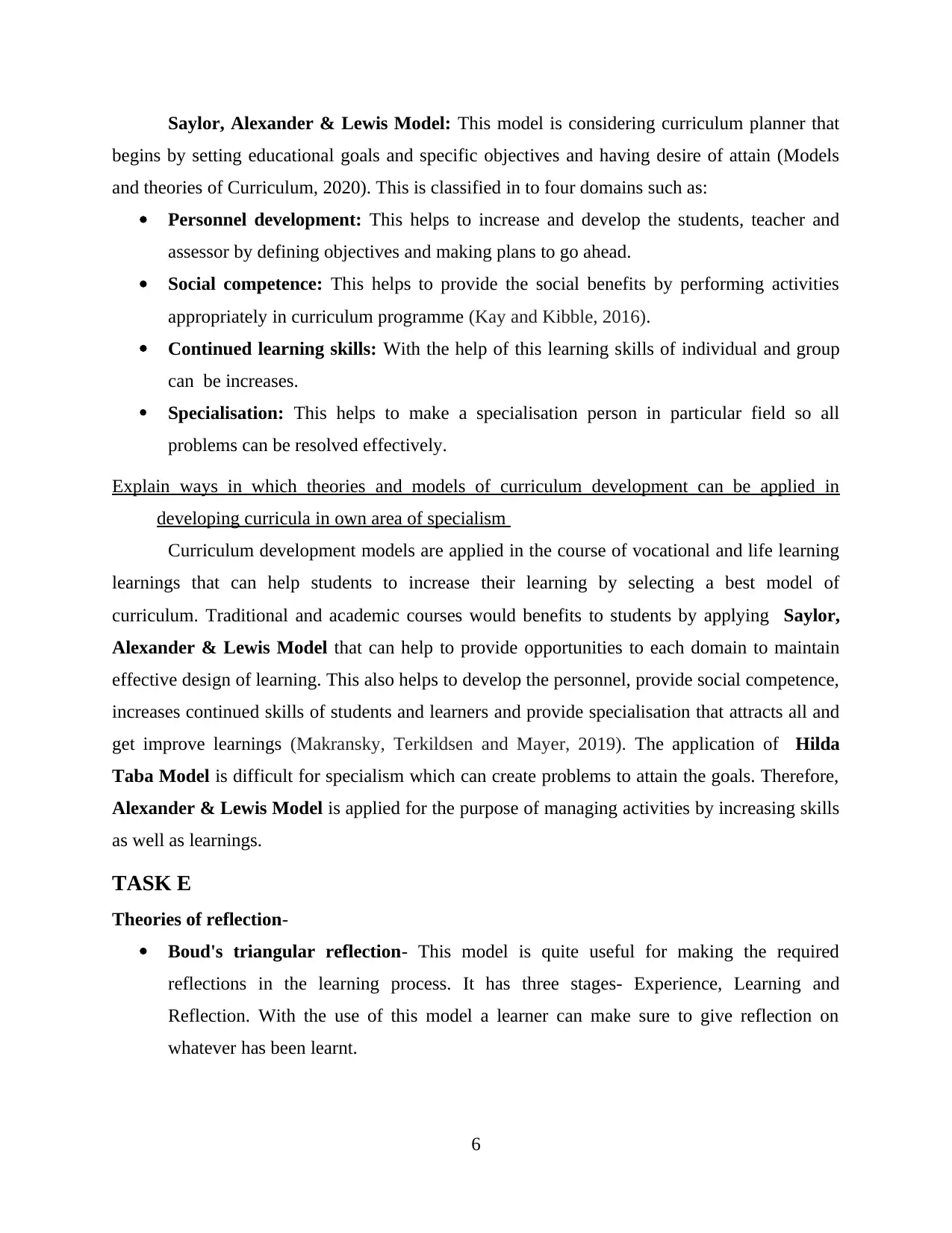
Saylor, Alexander & Lewis Model: This model is considering curriculum planner that
begins by setting educational goals and specific objectives and having desire of attain (Models
and theories of Curriculum, 2020). This is classified in to four domains such as:
Personnel development: This helps to increase and develop the students, teacher and
assessor by defining objectives and making plans to go ahead.
Social competence: This helps to provide the social benefits by performing activities
appropriately in curriculum programme (Kay and Kibble, 2016).
Continued learning skills: With the help of this learning skills of individual and group
can be increases.
Specialisation: This helps to make a specialisation person in particular field so all
problems can be resolved effectively.
Explain ways in which theories and models of curriculum development can be applied in
developing curricula in own area of specialism
Curriculum development models are applied in the course of vocational and life learning
learnings that can help students to increase their learning by selecting a best model of
curriculum. Traditional and academic courses would benefits to students by applying Saylor,
Alexander & Lewis Model that can help to provide opportunities to each domain to maintain
effective design of learning. This also helps to develop the personnel, provide social competence,
increases continued skills of students and learners and provide specialisation that attracts all and
get improve learnings (Makransky, Terkildsen and Mayer, 2019). The application of Hilda
Taba Model is difficult for specialism which can create problems to attain the goals. Therefore,
Alexander & Lewis Model is applied for the purpose of managing activities by increasing skills
as well as learnings.
TASK E
Theories of reflection-
Boud's triangular reflection- This model is quite useful for making the required
reflections in the learning process. It has three stages- Experience, Learning and
Reflection. With the use of this model a learner can make sure to give reflection on
whatever has been learnt.
6
begins by setting educational goals and specific objectives and having desire of attain (Models
and theories of Curriculum, 2020). This is classified in to four domains such as:
Personnel development: This helps to increase and develop the students, teacher and
assessor by defining objectives and making plans to go ahead.
Social competence: This helps to provide the social benefits by performing activities
appropriately in curriculum programme (Kay and Kibble, 2016).
Continued learning skills: With the help of this learning skills of individual and group
can be increases.
Specialisation: This helps to make a specialisation person in particular field so all
problems can be resolved effectively.
Explain ways in which theories and models of curriculum development can be applied in
developing curricula in own area of specialism
Curriculum development models are applied in the course of vocational and life learning
learnings that can help students to increase their learning by selecting a best model of
curriculum. Traditional and academic courses would benefits to students by applying Saylor,
Alexander & Lewis Model that can help to provide opportunities to each domain to maintain
effective design of learning. This also helps to develop the personnel, provide social competence,
increases continued skills of students and learners and provide specialisation that attracts all and
get improve learnings (Makransky, Terkildsen and Mayer, 2019). The application of Hilda
Taba Model is difficult for specialism which can create problems to attain the goals. Therefore,
Alexander & Lewis Model is applied for the purpose of managing activities by increasing skills
as well as learnings.
TASK E
Theories of reflection-
Boud's triangular reflection- This model is quite useful for making the required
reflections in the learning process. It has three stages- Experience, Learning and
Reflection. With the use of this model a learner can make sure to give reflection on
whatever has been learnt.
6
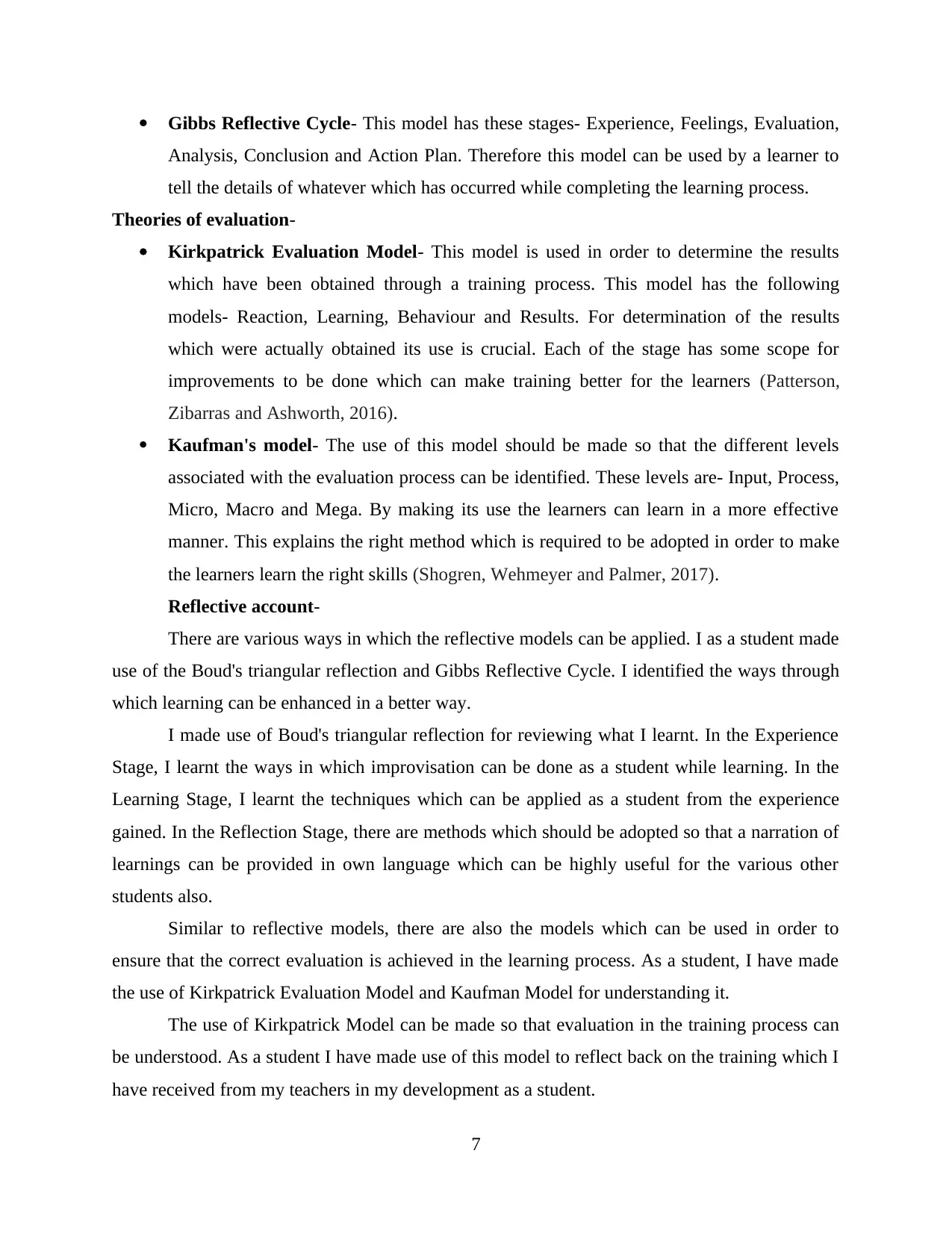
Gibbs Reflective Cycle- This model has these stages- Experience, Feelings, Evaluation,
Analysis, Conclusion and Action Plan. Therefore this model can be used by a learner to
tell the details of whatever which has occurred while completing the learning process.
Theories of evaluation-
Kirkpatrick Evaluation Model- This model is used in order to determine the results
which have been obtained through a training process. This model has the following
models- Reaction, Learning, Behaviour and Results. For determination of the results
which were actually obtained its use is crucial. Each of the stage has some scope for
improvements to be done which can make training better for the learners (Patterson,
Zibarras and Ashworth, 2016).
Kaufman's model- The use of this model should be made so that the different levels
associated with the evaluation process can be identified. These levels are- Input, Process,
Micro, Macro and Mega. By making its use the learners can learn in a more effective
manner. This explains the right method which is required to be adopted in order to make
the learners learn the right skills (Shogren, Wehmeyer and Palmer, 2017).
Reflective account-
There are various ways in which the reflective models can be applied. I as a student made
use of the Boud's triangular reflection and Gibbs Reflective Cycle. I identified the ways through
which learning can be enhanced in a better way.
I made use of Boud's triangular reflection for reviewing what I learnt. In the Experience
Stage, I learnt the ways in which improvisation can be done as a student while learning. In the
Learning Stage, I learnt the techniques which can be applied as a student from the experience
gained. In the Reflection Stage, there are methods which should be adopted so that a narration of
learnings can be provided in own language which can be highly useful for the various other
students also.
Similar to reflective models, there are also the models which can be used in order to
ensure that the correct evaluation is achieved in the learning process. As a student, I have made
the use of Kirkpatrick Evaluation Model and Kaufman Model for understanding it.
The use of Kirkpatrick Model can be made so that evaluation in the training process can
be understood. As a student I have made use of this model to reflect back on the training which I
have received from my teachers in my development as a student.
7
Analysis, Conclusion and Action Plan. Therefore this model can be used by a learner to
tell the details of whatever which has occurred while completing the learning process.
Theories of evaluation-
Kirkpatrick Evaluation Model- This model is used in order to determine the results
which have been obtained through a training process. This model has the following
models- Reaction, Learning, Behaviour and Results. For determination of the results
which were actually obtained its use is crucial. Each of the stage has some scope for
improvements to be done which can make training better for the learners (Patterson,
Zibarras and Ashworth, 2016).
Kaufman's model- The use of this model should be made so that the different levels
associated with the evaluation process can be identified. These levels are- Input, Process,
Micro, Macro and Mega. By making its use the learners can learn in a more effective
manner. This explains the right method which is required to be adopted in order to make
the learners learn the right skills (Shogren, Wehmeyer and Palmer, 2017).
Reflective account-
There are various ways in which the reflective models can be applied. I as a student made
use of the Boud's triangular reflection and Gibbs Reflective Cycle. I identified the ways through
which learning can be enhanced in a better way.
I made use of Boud's triangular reflection for reviewing what I learnt. In the Experience
Stage, I learnt the ways in which improvisation can be done as a student while learning. In the
Learning Stage, I learnt the techniques which can be applied as a student from the experience
gained. In the Reflection Stage, there are methods which should be adopted so that a narration of
learnings can be provided in own language which can be highly useful for the various other
students also.
Similar to reflective models, there are also the models which can be used in order to
ensure that the correct evaluation is achieved in the learning process. As a student, I have made
the use of Kirkpatrick Evaluation Model and Kaufman Model for understanding it.
The use of Kirkpatrick Model can be made so that evaluation in the training process can
be understood. As a student I have made use of this model to reflect back on the training which I
have received from my teachers in my development as a student.
7
⊘ This is a preview!⊘
Do you want full access?
Subscribe today to unlock all pages.

Trusted by 1+ million students worldwide
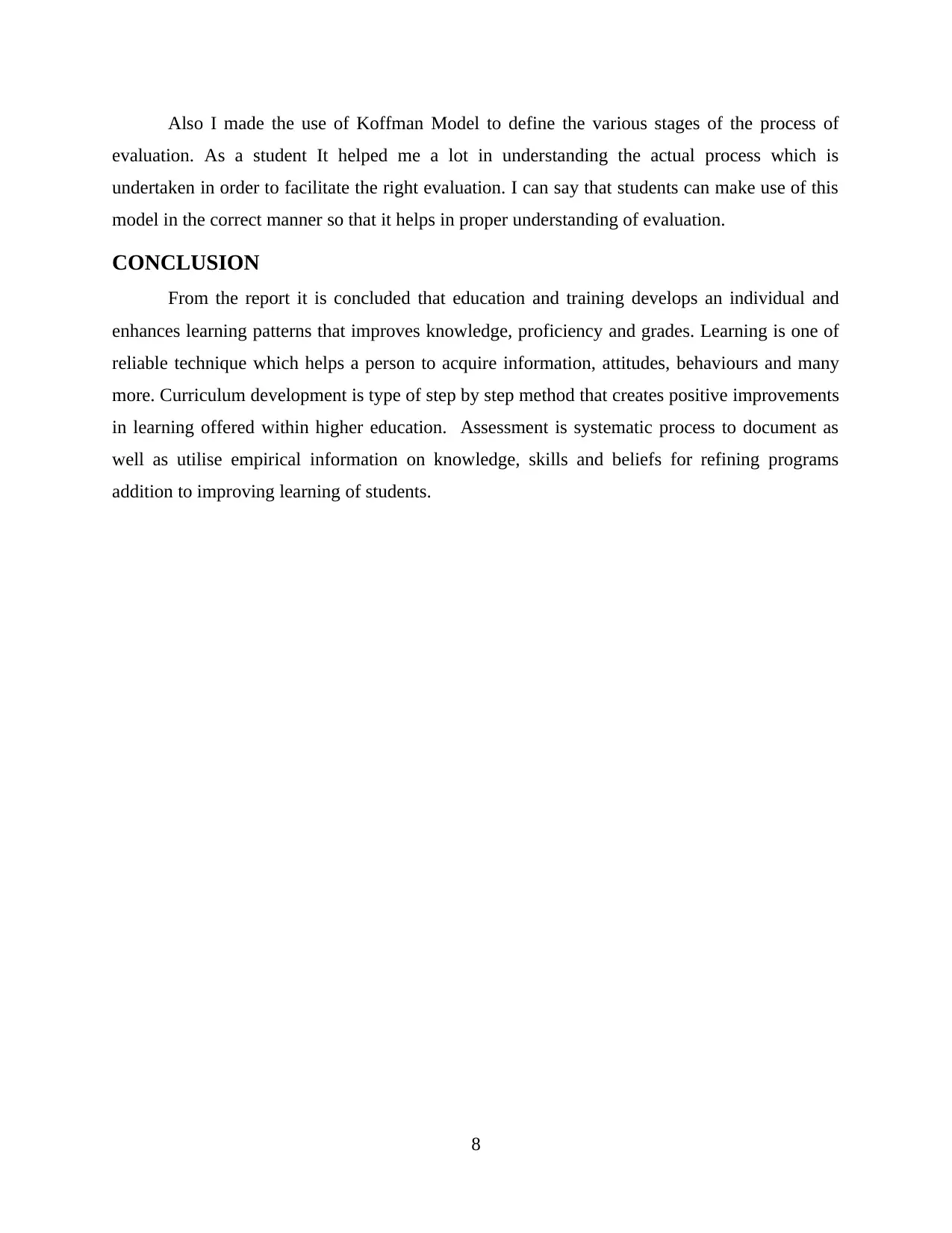
Also I made the use of Koffman Model to define the various stages of the process of
evaluation. As a student It helped me a lot in understanding the actual process which is
undertaken in order to facilitate the right evaluation. I can say that students can make use of this
model in the correct manner so that it helps in proper understanding of evaluation.
CONCLUSION
From the report it is concluded that education and training develops an individual and
enhances learning patterns that improves knowledge, proficiency and grades. Learning is one of
reliable technique which helps a person to acquire information, attitudes, behaviours and many
more. Curriculum development is type of step by step method that creates positive improvements
in learning offered within higher education. Assessment is systematic process to document as
well as utilise empirical information on knowledge, skills and beliefs for refining programs
addition to improving learning of students.
8
evaluation. As a student It helped me a lot in understanding the actual process which is
undertaken in order to facilitate the right evaluation. I can say that students can make use of this
model in the correct manner so that it helps in proper understanding of evaluation.
CONCLUSION
From the report it is concluded that education and training develops an individual and
enhances learning patterns that improves knowledge, proficiency and grades. Learning is one of
reliable technique which helps a person to acquire information, attitudes, behaviours and many
more. Curriculum development is type of step by step method that creates positive improvements
in learning offered within higher education. Assessment is systematic process to document as
well as utilise empirical information on knowledge, skills and beliefs for refining programs
addition to improving learning of students.
8
Paraphrase This Document
Need a fresh take? Get an instant paraphrase of this document with our AI Paraphraser
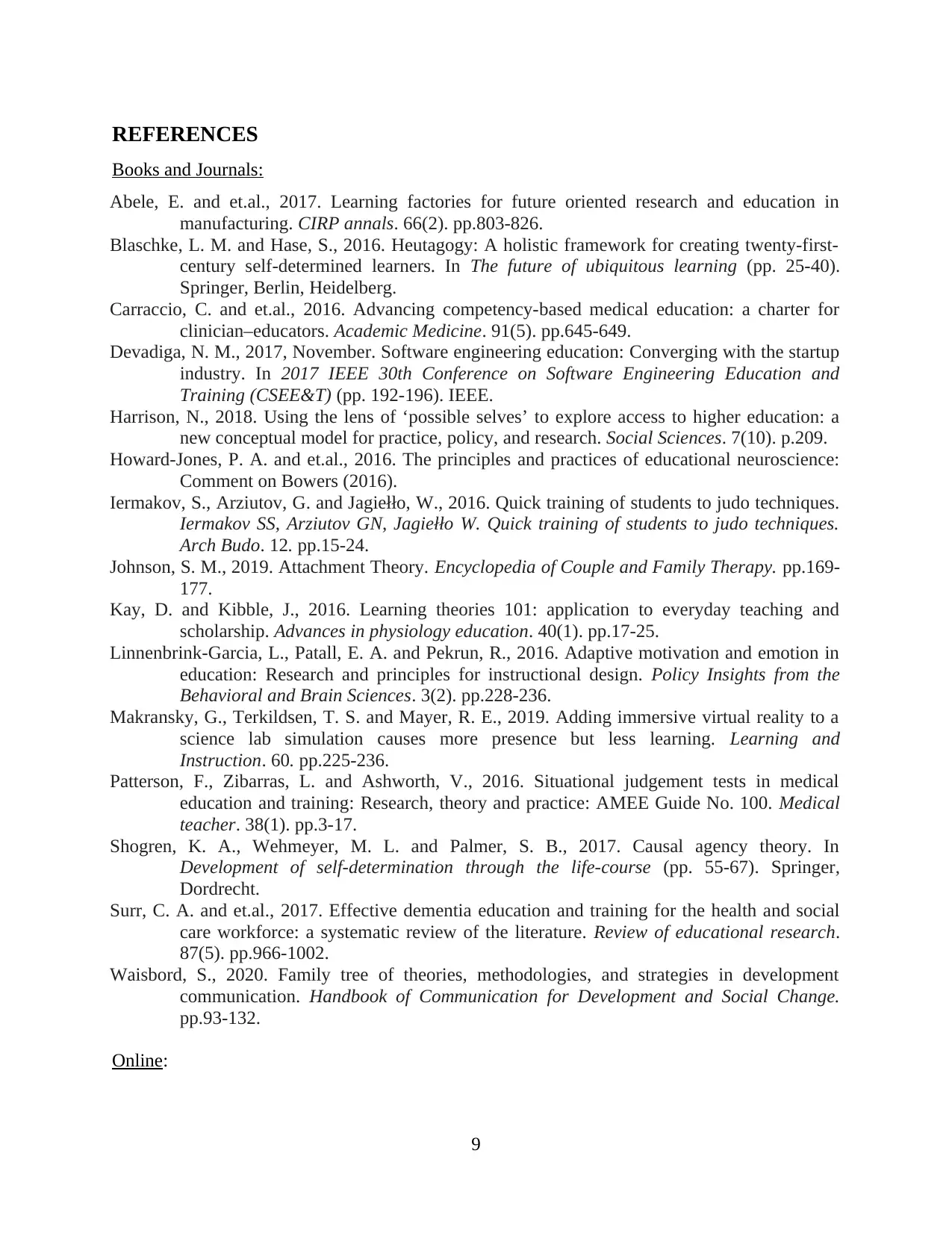
REFERENCES
Books and Journals:
Abele, E. and et.al., 2017. Learning factories for future oriented research and education in
manufacturing. CIRP annals. 66(2). pp.803-826.
Blaschke, L. M. and Hase, S., 2016. Heutagogy: A holistic framework for creating twenty-first-
century self-determined learners. In The future of ubiquitous learning (pp. 25-40).
Springer, Berlin, Heidelberg.
Carraccio, C. and et.al., 2016. Advancing competency-based medical education: a charter for
clinician–educators. Academic Medicine. 91(5). pp.645-649.
Devadiga, N. M., 2017, November. Software engineering education: Converging with the startup
industry. In 2017 IEEE 30th Conference on Software Engineering Education and
Training (CSEE&T) (pp. 192-196). IEEE.
Harrison, N., 2018. Using the lens of ‘possible selves’ to explore access to higher education: a
new conceptual model for practice, policy, and research. Social Sciences. 7(10). p.209.
Howard-Jones, P. A. and et.al., 2016. The principles and practices of educational neuroscience:
Comment on Bowers (2016).
Iermakov, S., Arziutov, G. and Jagiełło, W., 2016. Quick training of students to judo techniques.
Iermakov SS, Arziutov GN, Jagiełło W. Quick training of students to judo techniques.
Arch Budo. 12. pp.15-24.
Johnson, S. M., 2019. Attachment Theory. Encyclopedia of Couple and Family Therapy. pp.169-
177.
Kay, D. and Kibble, J., 2016. Learning theories 101: application to everyday teaching and
scholarship. Advances in physiology education. 40(1). pp.17-25.
Linnenbrink-Garcia, L., Patall, E. A. and Pekrun, R., 2016. Adaptive motivation and emotion in
education: Research and principles for instructional design. Policy Insights from the
Behavioral and Brain Sciences. 3(2). pp.228-236.
Makransky, G., Terkildsen, T. S. and Mayer, R. E., 2019. Adding immersive virtual reality to a
science lab simulation causes more presence but less learning. Learning and
Instruction. 60. pp.225-236.
Patterson, F., Zibarras, L. and Ashworth, V., 2016. Situational judgement tests in medical
education and training: Research, theory and practice: AMEE Guide No. 100. Medical
teacher. 38(1). pp.3-17.
Shogren, K. A., Wehmeyer, M. L. and Palmer, S. B., 2017. Causal agency theory. In
Development of self-determination through the life-course (pp. 55-67). Springer,
Dordrecht.
Surr, C. A. and et.al., 2017. Effective dementia education and training for the health and social
care workforce: a systematic review of the literature. Review of educational research.
87(5). pp.966-1002.
Waisbord, S., 2020. Family tree of theories, methodologies, and strategies in development
communication. Handbook of Communication for Development and Social Change.
pp.93-132.
Online:
9
Books and Journals:
Abele, E. and et.al., 2017. Learning factories for future oriented research and education in
manufacturing. CIRP annals. 66(2). pp.803-826.
Blaschke, L. M. and Hase, S., 2016. Heutagogy: A holistic framework for creating twenty-first-
century self-determined learners. In The future of ubiquitous learning (pp. 25-40).
Springer, Berlin, Heidelberg.
Carraccio, C. and et.al., 2016. Advancing competency-based medical education: a charter for
clinician–educators. Academic Medicine. 91(5). pp.645-649.
Devadiga, N. M., 2017, November. Software engineering education: Converging with the startup
industry. In 2017 IEEE 30th Conference on Software Engineering Education and
Training (CSEE&T) (pp. 192-196). IEEE.
Harrison, N., 2018. Using the lens of ‘possible selves’ to explore access to higher education: a
new conceptual model for practice, policy, and research. Social Sciences. 7(10). p.209.
Howard-Jones, P. A. and et.al., 2016. The principles and practices of educational neuroscience:
Comment on Bowers (2016).
Iermakov, S., Arziutov, G. and Jagiełło, W., 2016. Quick training of students to judo techniques.
Iermakov SS, Arziutov GN, Jagiełło W. Quick training of students to judo techniques.
Arch Budo. 12. pp.15-24.
Johnson, S. M., 2019. Attachment Theory. Encyclopedia of Couple and Family Therapy. pp.169-
177.
Kay, D. and Kibble, J., 2016. Learning theories 101: application to everyday teaching and
scholarship. Advances in physiology education. 40(1). pp.17-25.
Linnenbrink-Garcia, L., Patall, E. A. and Pekrun, R., 2016. Adaptive motivation and emotion in
education: Research and principles for instructional design. Policy Insights from the
Behavioral and Brain Sciences. 3(2). pp.228-236.
Makransky, G., Terkildsen, T. S. and Mayer, R. E., 2019. Adding immersive virtual reality to a
science lab simulation causes more presence but less learning. Learning and
Instruction. 60. pp.225-236.
Patterson, F., Zibarras, L. and Ashworth, V., 2016. Situational judgement tests in medical
education and training: Research, theory and practice: AMEE Guide No. 100. Medical
teacher. 38(1). pp.3-17.
Shogren, K. A., Wehmeyer, M. L. and Palmer, S. B., 2017. Causal agency theory. In
Development of self-determination through the life-course (pp. 55-67). Springer,
Dordrecht.
Surr, C. A. and et.al., 2017. Effective dementia education and training for the health and social
care workforce: a systematic review of the literature. Review of educational research.
87(5). pp.966-1002.
Waisbord, S., 2020. Family tree of theories, methodologies, and strategies in development
communication. Handbook of Communication for Development and Social Change.
pp.93-132.
Online:
9
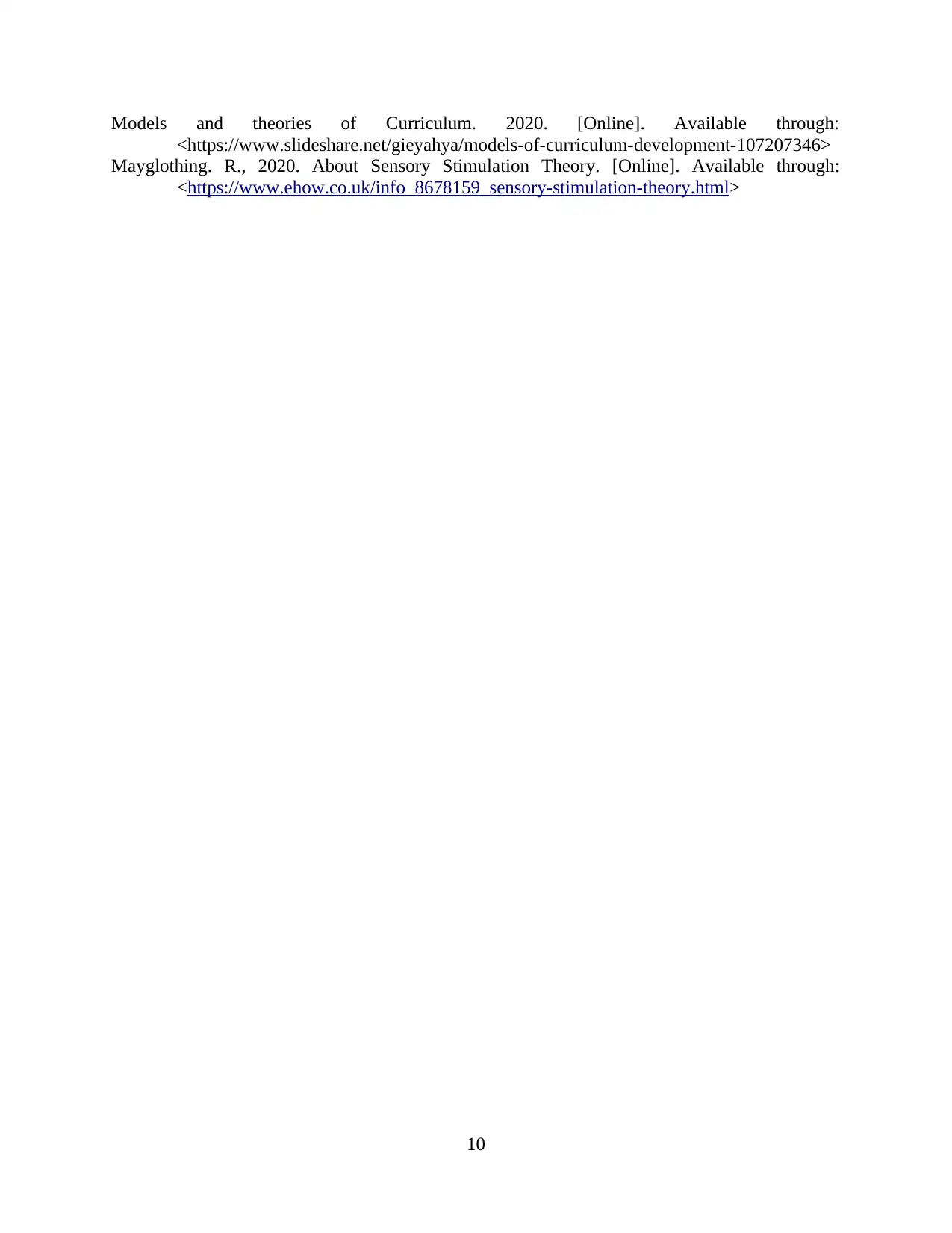
Models and theories of Curriculum. 2020. [Online]. Available through:
<https://www.slideshare.net/gieyahya/models-of-curriculum-development-107207346>
Mayglothing. R., 2020. About Sensory Stimulation Theory. [Online]. Available through:
<https://www.ehow.co.uk/info_8678159_sensory-stimulation-theory.html>
10
<https://www.slideshare.net/gieyahya/models-of-curriculum-development-107207346>
Mayglothing. R., 2020. About Sensory Stimulation Theory. [Online]. Available through:
<https://www.ehow.co.uk/info_8678159_sensory-stimulation-theory.html>
10
⊘ This is a preview!⊘
Do you want full access?
Subscribe today to unlock all pages.

Trusted by 1+ million students worldwide
1 out of 12
Related Documents
Your All-in-One AI-Powered Toolkit for Academic Success.
+13062052269
info@desklib.com
Available 24*7 on WhatsApp / Email
![[object Object]](/_next/static/media/star-bottom.7253800d.svg)
Unlock your academic potential
Copyright © 2020–2026 A2Z Services. All Rights Reserved. Developed and managed by ZUCOL.



